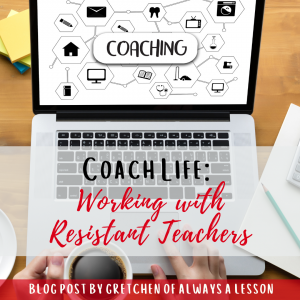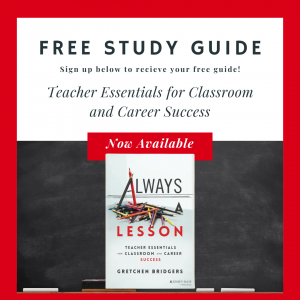Coach Life: Working with Resistant Teachers
Working with resistant teachers as an instructional coach can be challenging, but not impossible. A resistant teacher can be defined as “one who is unwilling and/or unlikely to participate in a requirement.” Requirements vary, but could be school-wide initiatives or new technology tools. Teachers could have problems with curriculum topics or instructional best practices. Additionally, behavior management systems or team building activities could be something that teachers don’t agree with.
 Reasons for Resistance
Reasons for Resistance
Resistant teachers are not horrible human beings or even poor educators. They are, however, experiencing emotions that result in resistant behaviors. Emotions such as stress, overwhelm, fear, frustration, etc. As a defense mechanism to avoid feeling these emotions, negative behaviors may surface. These behaviors could look like avoidance, negative attitudes, or lack of commitment. Teachers could also be tardy, withdrawn, or argue with others.
Working around Resistance
Leaders who notice resistance in teachers should find the reason for the struggle. Focus on building relationships with all teachers. The end goal should be working together to overcome these negative emotions. Oftentimes, teachers who show resistant behaviors can be referred to as “difficult.” The truth is they are disengaged. However, emotions can change. This means that leaders can still build effective partnerships with resistant teachers. Leaders can begin the conversation to help locate the source of negative emotions. There are a few simple ways to work around resistance:
- Interact with the teacher (greet them, cheer them on, talk when in a shared space, etc.)
- Check in on the teacher (keep tabs to ensure you know when the emotions and negative behaviors are developing)
- Ask the teacher to participate in activities that bring positive emotions (ie. their favorite hobby, with coworkers they favor, etc.).
These simple touch points keep the partnership going without diving deep into the emotions quite yet.
Working through Resistance
Now that resistant behaviors have been identified, it is time to dig into the emotions. However, this can only work if a surface level relationship exists. Trust plays an important role in the teacher being ready and willing to work through the resistance. Below are steps to follow:
-
- Meet 1:1
- Explain that you have noticed less engagement than normal
- Ask the teacher questions to help identify emotions
- Allow the teacher to share what they are comfortable with
- Remind them you are there to support them
- Share strategies for how to recognize, accept, and deal with the emotions
- Engage in a practice exercise of a common trigger at the work place (ie. colleagues frequent absences and the having to cover)
- Agree to meet consistently (weekly, monthly, quarterly) to check on emotions
- Celebrate growth, honesty, and willingness of returning to an engaged state
As a leader of people, it is important to remember that resistance is temporary. It is a reactive behavior that stems from an unwanted emotion. When we can help teachers recognize, identify, and overcome resistance, they can continue to have a successful career in education. Resistance is not a label for hard-headed, veteran teachers. Resistance can happen to anyone. As leaders we need to expose teachers to the reality of resistance occurring at some point in their journey. When they know it is common and can be overcome, no one will suffer in silence. Most importantly, we can help our best teachers remain effective despite resistance.
Want to continue your growth as a leader and learn strategies to best help teachers in the classroom? Consume bite-sized learning just for leaders here. (You can also listen on the go via the Teachable app!)
GO BE GREAT!
How do you work with resistant teachers effectively?


 Get Edu-Tips, Freebies and grab your FREE Study Guide for Gretchen’s New Book!
Get Edu-Tips, Freebies and grab your FREE Study Guide for Gretchen’s New Book!